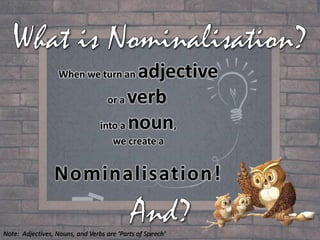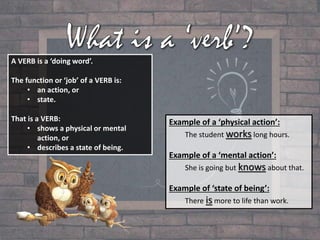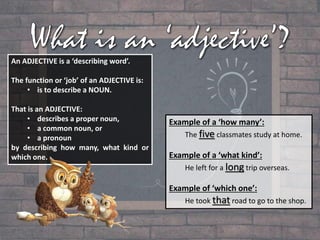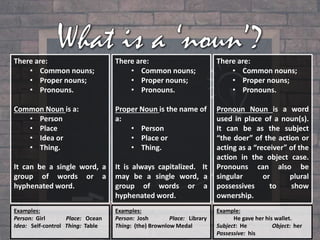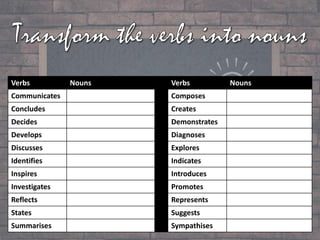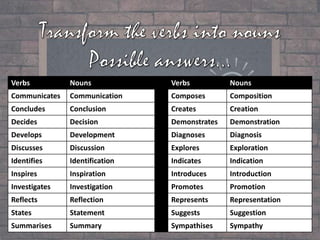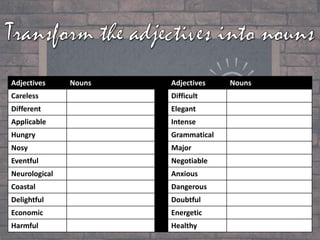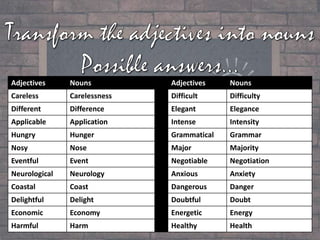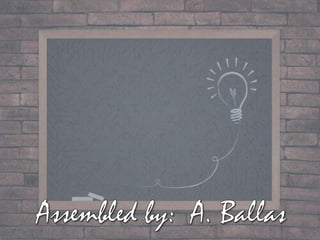- 1. Nominalisation
- 2. When we turn an adjective
or a verb
into a noun,
we create a
Nominalisation!
Note: Adjectives, Nouns, and Verbs are ‘Parts of Speech’
- 3. A VERB is a ‘doing word’.
The function or ‘job’ of a VERB is:
• an action, or
• state.
That is a VERB:
• shows a physical or mental
action, or
• describes a state of being.
Example of a ‘physical action’:
The student works long hours.
Example of a ‘mental action’:
She is going but knows about that.
Example of ‘state of being’:
There is more to life than work.
- 4. An ADJECTIVE is a ‘describing word’.
The function or ‘job’ of an ADJECTIVE is:
• is to describe a NOUN.
That is an ADJECTIVE:
• describes a proper noun,
• a common noun, or
• a pronoun
by describing how many, what kind or
which one.
Example of a ‘how many’:
The five classmates study at home.
Example of a ‘what kind’:
He left for a long trip overseas.
Example of ‘which one’:
He took that road to go to the shop.
- 5. There are:
• Common nouns;
• Proper nouns;
• Pronouns.
Common Noun is a:
• Person
• Place
• Idea or
• Thing.
It can be a single word, a
group of words or a
hyphenated word.
There are:
• Common nouns;
• Proper nouns;
• Pronouns.
Proper Noun is the name of
a:
• Person
• Place or
• Thing.
It is always capitalized. It
may be a single word, a
group of words or a
hyphenated word.
There are:
• Common nouns;
• Proper nouns;
• Pronouns.
Pronoun Noun is a word
used in place of a noun(s).
It can be as the subject
“the doer” of the action or
acting as a “receiver” of the
action in the object case.
Pronouns can also be
singular or plural
possessives to show
ownership.
Examples:
Person: Girl Place: Ocean
Idea: Self-control Thing: Table
Examples:
Person: Josh Place: Library
Thing: (the) Brownlow Medal
Example:
He gave her his wallet.
Subject: He Object: her
Possessive: his
- 6. Verbs Nouns Verbs Nouns
Communicates Composes
Concludes Creates
Decides Demonstrates
Develops Diagnoses
Discusses Explores
Identifies Indicates
Inspires Introduces
Investigates Promotes
Reflects Represents
States Suggests
Summarises Sympathises
- 7. Verbs Nouns Verbs Nouns
Communicates Communication Composes Composition
Concludes Conclusion Creates Creation
Decides Decision Demonstrates Demonstration
Develops Development Diagnoses Diagnosis
Discusses Discussion Explores Exploration
Identifies Identification Indicates Indication
Inspires Inspiration Introduces Introduction
Investigates Investigation Promotes Promotion
Reflects Reflection Represents Representation
States Statement Suggests Suggestion
Summarises Summary Sympathises Sympathy
- 8. Adjectives Nouns Adjectives Nouns
Careless Difficult
Different Elegant
Applicable Intense
Hungry Grammatical
Nosy Major
Eventful Negotiable
Neurological Anxious
Coastal Dangerous
Delightful Doubtful
Economic Energetic
Harmful Healthy
- 9. Adjectives Nouns Adjectives Nouns
Careless Carelessness Difficult Difficulty
Different Difference Elegant Elegance
Applicable Application Intense Intensity
Hungry Hunger Grammatical Grammar
Nosy Nose Major Majority
Eventful Event Negotiable Negotiation
Neurological Neurology Anxious Anxiety
Coastal Coast Dangerous Danger
Delightful Delight Doubtful Doubt
Economic Economy Energetic Energy
Harmful Harm Healthy Health


